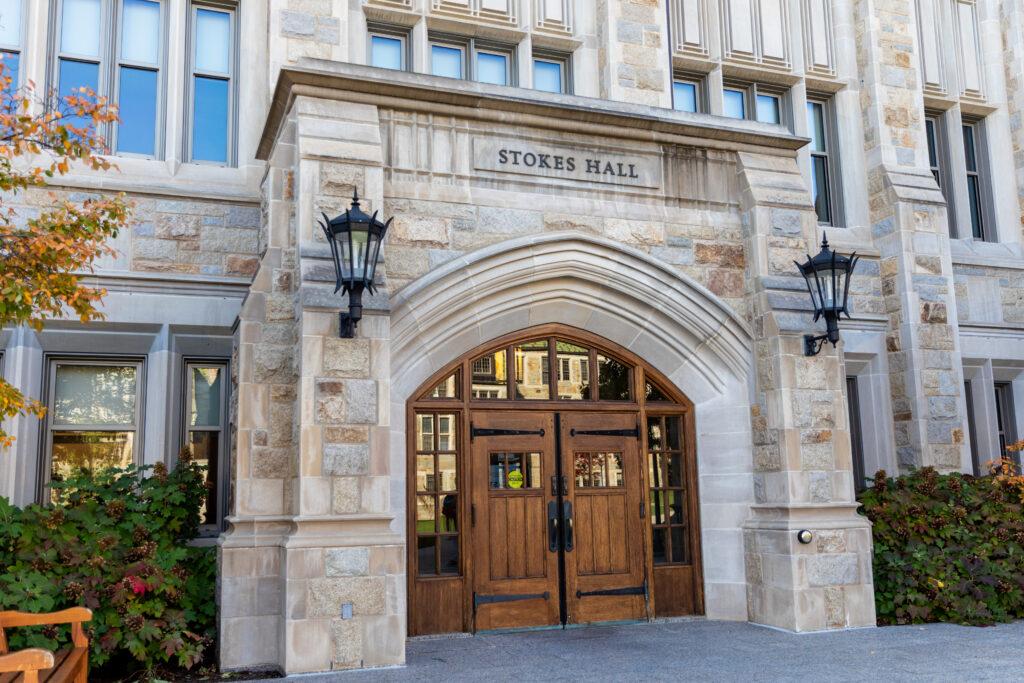One major change to academic life at BC this semester was a decrease of in-person time between professors and students. For some professors, the smiling faces on Zoom were enough to keep motivation up during the semester, but others lamented the loss of interpersonal relationships with their students.
“If there’s one motivating factor in my work, it is that I turn my screen on and there are 40 young people looking to me to focus this one hour and 15 minutes,” said Susan Thompson, who teaches in the theatre department. “They’re intellectually curious, they want to be engaged, they want to be challenged.”
Thompson said that she strives for her class, despite it being over Zoom, to be a place where students can find a sense of community and feel connected during a time of so much loss.
“The biggest challenge is that we are in a pandemic where there is so much uncertainty,” Thompson said. “There is loss. There is loss not just of neighbors and conviviality with roommates … but also loss of family and the elders of your family.”
For communication professor Ali Erol, though, forming connections with students this semester has not been easy.
“I cannot have the same sense of rapport that I had during previous semesters,” Erol said. “Luckily, I have some students that I had in previous years in my classes and I could build upon that connection, but unfortunately, for the most part, it still feels quite distant.”
Another adjustment professors have had to face has been incorporating new technologies into their teaching.
Mark Thatcher, assistant professor of classical studies, said that using technology to move his classes online this semester has been a “win some, lose some” situation. Though technological issues have been a downside, he said that the switch to holding exams on Canvas has been successful.
“When we go back to regular times, I’m going to have to decide whether to go back to doing in-person quizzes and take up class time with that or to do it via Canvas,” Thatcher said.
In order to better facilitate class discussions, Thatcher split his 40-person Greeks and Barbarians course into two sections, and meets with each section separately for 30-minute group discussions during their 75-minute class time.
“It’s leading to better attention and more in-depth discussion,” Thatcher said. “We don’t have as much time but we could be more focused.”
For Thompson, though, conducting exams remotely has been a point of difficulty this semester. Concerns about academic integrity and a worry about increasing students’ stress levels led Thompson to swap her midterm exam for a take-home monologue assignment in her online Intro to Theatre class. Students reacted positively to the switch, she said.
“I don’t want to make their lives more stressful,” Thompson said. “I think the students liked it a lot more and I felt a stress go out of the room when I changed the midterm format.”
Due to the hectic nature of 2020 as a whole, students have had heightened stress levels, according to Erol. While students typically use the summer as a time to unwind and take a break, he said, last summer was very different and some students returned to school already drained.
“This year was an exhausting year for many reasons,” Erol said. “So from the beginning of the semester there has been lower energy. From what I observed, everyone began the semester already tired.”
One source of stress for students over the summer was the uncertainty around the fall semester, according to Thomas Wesner, a professor of business law. In his fully in-person classes this semester, Wesner observed that students were excited to be back on campus but, after seeing the initial spikes in cases of COVID-19 at peer schools, they were unsure of how long the in-person experience would last.
“I did notice that students were very happy to be back in person and remain so,” Wesner said. “Most thought we wouldn’t make it to Columbus Day, so my observation is that students have done a really good job and have been attentive to the COVID restrictions.”
Wesner said that, despite their impressive work ethic so far, students are undoubtedly suffering from “COVID fatigue.” One of the reasons for this, he said, is that the places students typically go to for relaxation and refuge have become classrooms.
“Students’ dormitories and off-campus apartments have always been a place to go to between and after classes and kick off their shoes and relax a bit,” Wesner said. “Well, now those spaces are places where their roommates are in class Zooming, taking quizzes, taking tests, and have overall become study spaces rather than relaxing places.”
Despite the unique circumstances of hybrid learning that may prevent professors from connecting with students, Wesner is proud of how the BC community has handled this semester.
“Not being able to see mouths and hear voices and watch reactions to maybe corny jokes has made it harder to perceive that BC students are, like they always are, engaging, personable, enthusiastic and vibrant people,” Wesner said. “You have to teach through that.”
Featured Image by Jess Rivilis / Heights Editor



















